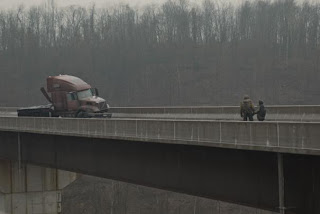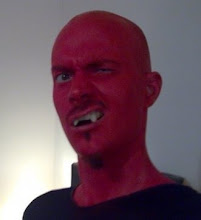The Book of Eli
What can be said about Denzel Washington? If you want an actor to have an air of gravitas, a certain dignity and authority, yet still have a threatening presence, he’s your man. Liam Neeson is another actor with the bearing and worldly-wise sense of statesmanship to fit similar roles, but when called on to perform more violent scenes his sneer and snarl can possibly be read as that of the bad guy, whereas Denzel comes across a man who would kill with regret, attacking as a last resort.
And so to the Book of Eli. It’s hard to work out whether it’s a film about the redemptive power of Christian faith masquerading as a film about the post-apocalyptic American wasteland, or a kick-ass dystopian action movie masquerading as a film about faith?
The final twist - that Eli is blind - is a little hard to stomach. It’s not hard to recall scenes where other heightened senses don’t serve as sufficient explanation for his actions. Any amount of accurate violence can be attributed to finely trained senses of smell and hearing, but general orientation is a little harder to bear. In one scene there is a shoot out in the main street of a ramshackle town in the Western tradition. Eli takes out each henchman with a pistol, a mere one or two shots for each, but how does he navigate the street itself and know where to find cover?
For the majority of the film it doesn’t seem to be an issue - you’ll look back on scenes of feeling the sunlight on skin rather than needing to see it; knowing a woman’s hands were shaking not by sight, but because of the teacup and saucer she held.
For the most part the main impact comes from the blasted landscape of dust and saturated colour that Eli makes his way through, on an incongruously pristine highway headed west.
Such emphasis on the visual aspects come through in the first scene of the film, reminiscent of recent Wushu/Wuxia features, a twilight forest with ash lightly raining down. Panning across the body of a man, pistol dropped from his hand, we see a hairless cat approach the corpse, sniff and start to feed. Further off we see an imposing figure in the gloom and ash, hooded and gas-masked, his legs strain at a bow held level with the ground and aimed at the bait - his trap that the cat has sprung.
On the road we see Eli’s encounters with cannibal bandits, dispatching his enemies with lethal efficiency. The Wushu influences come forward again as Eli slices through his enemies with swift, fluid movements.
His journey takes him to a small town led by Gary Oldman in the style of another Western tradition - from the upstairs of a saloon bar. He sends teams of bandits into the wastes to search for books, after one in particular - the bible, a weapon to rule men’s hearts and minds.
The cause of the apocalypse is never spelled out but talk of a war, and of the sky ripped apart to see the sun fall to the earth and set it on fire accompany the blinding of most of the survivors of that time.
Few of the new Americans (all white, incidentally, and in the classic post-apocalypse ‘scrappy punk’ style) are able to read, but they serve as evidence that despite the harsh conditions people still went on having kids.
One such new citizen is Solara (Mila Kunis), the impossibly beautiful mini-clone of Angelina Jolie, all big eyes, full lips and dark, smouldering looks. How she has kept this alluring visage in the face of such devastation is a mystery; Gary Oldman’s Carnegie basically owns her and her blind mother, keeping both safe from harm (from others, at least), but there’s only so much soap, shampoo and moisturiser left in this ravaged world.
Still, she does a good job of standing in for innocent youth and the possibilities of the future.
Cannibals can apparently be detected as their hands get the shakes - presumably no-one suffers from any traumatic stress in this nightmare.
There is a slightly comedic moment when Eli & Solara come across the booby-trapped farmhouse of an old couple of cannibals, Michael Gambon and Frances de la Tour as George and Martha, who swing from threat to allies when Oldman and goons arrive, somehow tracking them on a straight road even though we see Eli and Solara look down on the house from a cliff top.
In the West is Alcatraz, repurposed as the museum of culture, a sanctuary where none other than Malcolm MacDowell in mad professor guise compiles examples of art and literature and other pre-war cultural treasures. Most copies of the bible were burned shortly after the war as apparently it was seen as the cause, so Eli’s book is a very rare specimen. The end of the film sees him cleaned and shaved and dressed in a white robe, laid in repose and reciting the entirety of the bible before passing away, presumably not from the gutshot wound he sustained before starting to recite aloud the entire King James bible.
Apparently it is 31 years since he has been travelling. It’s never explicitly stated when in this time he had a voice tell him to take the bible and head West, but it’s safe to presume it doesn’t take that many years to walk across a mostly deserted United States. And how can he calculate that it has been 31 years since the war, but not remember his age?
The Book of Eli is very silly but Denzel’s very watchable and it’s always nice to see Gary Oldman getting his ham on.
*the Book of Eli gets two pictures due to the lovely artwork of Chris Weston:
The Road
Literary adaptations are a hard one. Quite often what makes for a good book doesn’t necessarily translate to the screen, especially if it’s the quality of prose and character development that shines rather than the snappiness of the “Snakes. On a PLANE!” plot.
The Road is quite a faithful adaptation of the Cormac McCarthy novel, but even it falls foul of the traps that often plague such translations between media. No matter how talented the actor, there is only so much you can convey without words in the limited time available during a standard feature length, and The Road makes use of a voice over which slightly detracts from the story, giving you a third perspective of the father looking upon himself and his son, removing you a step from the business of their struggle for survival. Likewise, the flashback/dream sequences of Charlize Theron as the mother seem more numerous than in the source material, and again serve to pull you back a little from your identification with the pair.
Conversely, we are so used to representations of post-apocalyptic life involving extras from Duran Duran’s Wild Boys video (see everything from Mad Max and Escape from New York to Doomsday and Book of Eli) that the wandering survivors of the Road seems less threatening in comparison, more desperate tramps than fearsome cannibals, with the key confrontation having more of a Deliverance feel than anything.
Aside from this the film is wonderfully made, a cold and dirty wasteland of dead, creaking trees with a haggard looking Viggo Mortensen as the father, struggling along in rags in an attempt to get his son South. In a couple of scenes we see him strip and are witness to the Machinist-style methods to which Viggo went to in order to bring the character to life, starving himself down to ribs and knobbled spine, but these glimpses are only fleeting and I did wonder whether it was necessary to the film in order to convince us of his dedication. His starvation may indeed be a plot point, but you’d hardly expect the rest of the actors to follow suit; it’s something that can be alluded to rather than shown.
And this is the general feeling I get from the film - yes, it’s impressive and care and attention have been expended on the production, but at the end of the day what is the point - what has it added? As a straight adaptation of the book there does seem to be something lost in translation.
As an entry into the increasingly crowded dystopia genre, however, The Road fares well, leaning much more toward a realistic take as in Haneke’s Time of the Wolf, rather than the more fantastical readings of the aforementioned punk-haircut fests. Severed from the source material The Road stands a chance of competing well and will no doubt showered with award nominations, if not awards themselves, which isn’t bad for such a bleak view on the fall of man, where the thought of suicide is constantly on the mind as a viable option.
Not as good as the book, no, but a decent attempt at a realist survival tale.





2 comments:
The Book of Eli doesn't have any major Wushu references or influences that I can see. Its a samurai movie. That final twist - and you really should give spoiler warnings, its an Internet law - just makes it clear that its been a Zatoichi movie all along. Yes, a Zatoichi movie with some massive plot holes - I was convinced for a long stretch that his iPod was some sort of satellite-connected GPS with an inbuilt forcefield but no, he just liked Al Green and was good at shooting people he couldn't see while they all missed him - but a Zatoichi movie nonetheless.
It was the visuals I was talking about, something about the saturated colour, the ash and the forest gave that scene a feel I've had in things like House of Flying Daggers.
Thematically yeah, it's a samurai movie and the Zatoichi thing cements that. He's not even a Ronin as he is working for a Lord.
As for spoilers, this whole blog is spoiled, surely? Very few of the reviews don't give something away. I thought the "There Will Be Spoilers" tagline covered that, but when I spoke to Davey recently he thought it was just there as a play on the movie title - seriously, is the style of that phrase so distinctive that content gets divorced from it?
Post a Comment